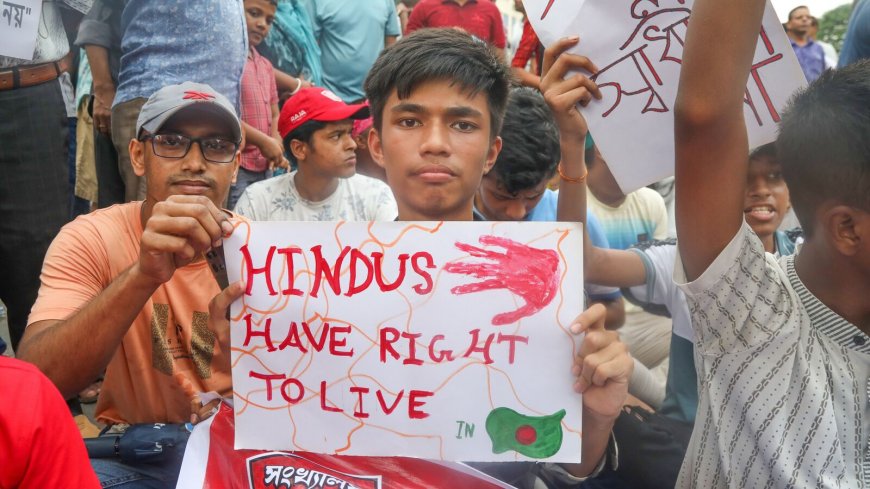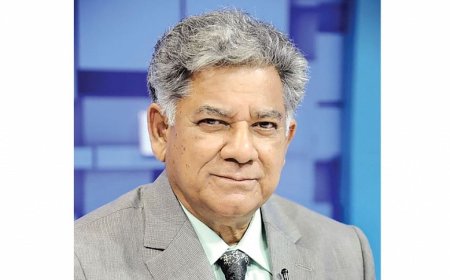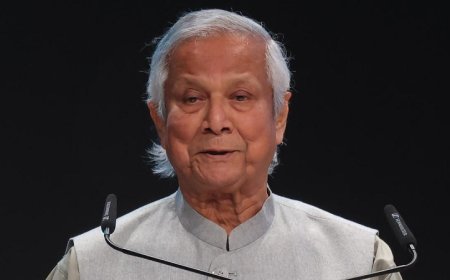"‘Our lives are insignificant’: Bangladeshi Hindus targeted following Hasina’s departure"
Bangladeshi Hindus, perceived as supporters of the ousted Prime Minister Sheikh Hasina, are facing increasing threats amid rising anti-India sentiments. An India-based disinformation campaign is exacerbating their situation.

Krishna Das never anticipated that his peaceful life in Sunamganj, a northeastern district of Bangladesh, would be shattered on a seemingly ordinary Tuesday evening last week.
The incident was sparked by a blasphemy accusation. A young Hindu man, Akash Das, reportedly posted a disrespectful comment about the Quran on Facebook. The comment spread quickly across social media, triggering protests and escalating tensions, especially in the predominantly Muslim community of Dowarabazar, located around 270 km (168 miles) from Dhaka. Krishna, at home in Monglargaon village, first heard the noise around 8 pm. “I heard shouting from the market,” Krishna recalled. “I couldn’t make sense of it, but something felt wrong.”
Stepping outside, he saw a crowd gathering, chanting slogans. The crowd soon swelled into a mob, brandishing sticks and batons. “I rushed inside, locked the doors, and hid,” Krishna said. “But they broke in anyway.” Despite the fact that Akash Das, the 17-year-old Hindu from his neighborhood, had been arrested by the police under the Cyber Security Act before the mob arrived, the violence spread rapidly.
“They destroyed everything – everything I worked for. It was as if we were nothing – our lives didn’t matter,” Krishna, a small-scale farmer, shared with Al Jazeera. “They smashed windows, destroyed furniture, and looted anything of value. They took money, jewelry, even kitchen utensils.” The attackers also set part of his house on fire. Although Krishna managed to put out the flames, the damage was devastating – his tin-roofed home was destroyed, and their possessions were gone. His family’s sense of security was shattered. When Al Jazeera visited four days later, his wife and two teenage sons had moved to relatives’ homes in the city for safety.
At least 20 other Hindu homes in Monglargaon were also targeted.
“When they attacked my home, my wife and two daughters fled through the back into the jungle,” said Bijon Das, another local Hindu. “I sent them to relatives in Sylhet for safety,” he added, noting that several Hindu men remained behind to guard their homes.
The mob violence lasted for about three to four hours before security forces intervened. “Most of the damage was to tin-roofed houses and tin-shuttered shops,” reported local journalist AR Jewel, who was present during the attack. He estimated that around 20 properties were affected.
However, Meher Nigar Tanu, the top bureaucrat for the subdistrict, downplayed the scale of the violence, claiming that “only a few homes and shops were slightly damaged” and some reports had been “exaggerated.” She also mentioned that law enforcement managed to stop a mob from entering a local ISKCON temple.
In Monglargaon, a sense of fear lingered. On Friday morning, many homes were locked, and the streets were eerily quiet, with security forces stationed at street intersections. For many Hindus in Bangladesh, Monglargaon symbolized the community’s deepening insecurities.
A Twofold Problem
On August 5, following a popular uprising against her increasingly authoritarian rule, Prime Minister Sheikh Hasina fled Bangladesh for India, marking the end of her 15-year reign. Over 1,000 people died in the security forces’ crackdown before she resigned. India is widely believed to have supported Hasina’s regime. During her time in power, Hasina’s secular policies were seen as more sympathetic to the Hindu minority, which comprises 10% of Bangladesh’s population, compared to other major political forces, such as the Bangladesh Nationalist Party (BNP) and Jamaat-e-Islami.
Reports following Hasina’s departure indicate widespread looting and the ransacking of monuments and government buildings. More than 200 people were killed, most of them Awami League activists and police officers, as violence erupted in the wake of Hasina’s fall.
The Bangladesh Hindu Buddhist Christian Unity Council (BHBCUC), a minority rights group, reported 2,000 instances of “communal violence” between August 4 and 20, including nine Hindu deaths and 69 attacks on places of worship. However, independent investigations suggested that the deaths were politically motivated rather than religiously driven.
Meanwhile, the relationship between India and Bangladesh soured, and some Indian media outlets exaggerated the extent of the violence against Hindus in Bangladesh. "Assaults on minority groups are common in Bangladesh, especially when the government changes," said Deboraj Bhattacharjee, a Hindu banker in Dhaka. “But the way certain Indian media outlets, aligned with BJP, twist the reality and spread fear doesn’t help us here.” An independent Bangladeshi fact-checking organization, Rumor Scanner, found that 49 Indian media outlets spread at least 13 false reports about Bangladesh between August 12 and December 5, 2024.
“Since Hasina’s fall, it’s impossible to ignore the fear and insecurity that many Hindus feel, particularly in rural areas,” Bhattacharjee added. He pointed out that anti-Hindu religious activists, who had limited power during Hasina’s rule, are now emboldened.
Increased Attacks and Continued Insecurity
Abhro Shome Pias, a 27-year-old Hindu student at the Bangladesh University of Engineering and Technology (BUET), noted the numerous incidents of violence and persecution against Hindus, with displaced families having their land forcibly taken. “It’s unclear whether they’ve received justice or compensation,” Pias said.
Hindus in Bangladesh often feel pressure to prove their loyalty to the country, particularly due to their deep ties to religious sites in India. “India is home to 90% of our religious sites, but many Hindus here do not support the current Indian government or its 'Hindutva' extremism,” Pias explained.
Chakravarty, a 29-year-old pharmacy owner, described how he was trapped inside his shop during the recent violence. “I kept thinking about my daughter’s safety,” he said, recalling the chaos as a mob attacked nearby businesses. “If they had gotten inside, they might have beaten me to death.”
Though there were no fatalities in the market attack, many Hindu homes were ransacked. Chakravarty returned home to find everything destroyed. “There was nothing left,” he said.
Despite this, Chakravarty emphasized that this kind of violence was unprecedented for the region. “People here used to celebrate festivals together. This has never happened before,” he said. “This will leave a scar for a long time.”
Blame and Disinformation
The interim leadership in Bangladesh, led by 84-year-old Nobel laureate Muhammad Yunus, has accused Indian media of exaggerating the violence against Hindus in Bangladesh. Yunus's press secretary acknowledged some attacks on religious minorities but argued that many reports were exaggerated and part of a disinformation campaign.
Hindu activists have protested across Bangladesh, demanding better protection for minorities, including laws to safeguard them, the creation of a minority ministry, and a tribunal to prosecute oppression against them. Protests intensified after the arrest of Chinmoy Krishna Das, a Hindu monk, in November. His detention sparked a deadly clash with police and subsequent protests calling for the release of Hindus.
Meanwhile, Hasina, now in exile in India, accused the interim government of failing to protect minorities and of allowing violence against Hindus and other religious communities.
Was Life Safer Under Hasina?
Some Hindus argue that life wasn’t necessarily safer under Hasina’s rule. Bhattacharjee, for instance, recalled losing family land to an Awami League MP’s activists. “Hindus were used as political pawns,” he said, “the sense of safety under Hasina was more psychological than real.”
However, Sreeradha Datta, a Bangladesh expert, argued that while violence against Hindus occurred during Hasina’s tenure, her secular policies generally made minority groups feel more secure compared to previous non-Awami League governments.
Concerns about the rise of religious extremism and the potential removal of secularism from Bangladesh’s constitution have raised alarms among Hindu groups. If secularism is removed, it could signal a significant threat to religious minorities’ rights. Bhattacharjee warned that such a move would send a message that minorities no longer matter to the state.
“Words aren’t enough anymore,” he said, emphasizing that the real challenge for the interim government is ensuring the safety of Hindu minorities amid rising violence and emboldened fundamentalist groups.
What's Your Reaction?





















































































